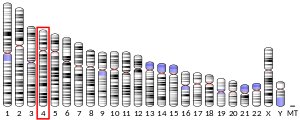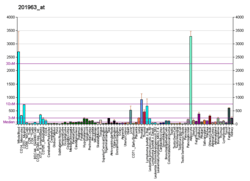ACSL1
Long-chain-fatty-acid—CoA ligase 1 is an enzyme that in humans is encoded by the ACSL1 gene.[5][6][7]
Structure
Gene
The ACSL4 gene is located on the 4th chromosome, with its specific location being 4q35.1. The gene contains 28 exons.[7]
The protein encoded by this gene is an isozyme of the long-chain fatty-acid-coenzyme A ligase family. Although differing in substrate specificity, subcellular localization, and tissue distribution, all isozymes of this family convert free long-chain fatty acids into fatty acyl-CoA esters, and thereby play a key role in lipid biosynthesis and fatty acid degradation.[7]
In melanocytic cells ACSL1 gene expression may be regulated by MITF.[8]
Function
The protein encoded by this gene is an isozyme of the long-chain fatty-acid-coenzyme A ligase family. Although differing in substrate specificity, subcellular localization, and tissue distribution, all isozymes of this family convert free long-chain fatty acids into fatty acyl-CoA esters, and thereby play a key role in lipid biosynthesis and fatty acid degradation.[7] Several transcript variants encoding different isoforms have been found for this gene. This specific protein is most commonly found in mitochondria and peroxisomes.[9]
Clinical significance
ACSL1 is known to be involved in fatty-acid metabolism critical for heart function [10] and nonspecific mental retardation.[11] Since the ACSL4 gene is highly expressed in brain, where it encodes a brain specific isoform, an ASCL1 mutation may be an efficient diagnostic tool in mentally retarded males.[12]
Interactions
ACSL1 expression is regulated by SHP2 activity.[13] Additionally, ACSL4 interacts with ACSL3, APP, DSE, ELAVL1, HECW2, MINOS1, PARK2, SPG20, SUMO2, TP53, TUBGCP3, UBC, UBD, and YWHAQ.[7]
References
- GRCh38: Ensembl release 89: ENSG00000151726 - Ensembl, May 2017
- GRCm38: Ensembl release 89: ENSMUSG00000018796 - Ensembl, May 2017
- "Human PubMed Reference:". National Center for Biotechnology Information, U.S. National Library of Medicine.
- "Mouse PubMed Reference:". National Center for Biotechnology Information, U.S. National Library of Medicine.
- Suzuki H, Kawarabayasi Y, Kondo J, Abe T, Nishikawa K, Kimura S, Hashimoto T, Yamamoto T (May 1990). "Structure and regulation of rat long-chain acyl-CoA synthetase". The Journal of Biological Chemistry. 265 (15): 8681–5. PMID 2341402.
- Stanczak H, Stanczak JJ, Singh I (Feb 1992). "Chromosomal localization of the human gene for palmitoyl-CoA ligase (FACL1)". Cytogenetics and Cell Genetics. 59 (1): 17–9. doi:10.1159/000133189. PMID 1531127.
- "Entrez Gene: ACSL1 acyl-CoA synthetase long-chain family member 1".
- Hoek KS, Schlegel NC, Eichhoff OM, Widmer DS, Praetorius C, Einarsson SO, Valgeirsdottir S, Bergsteinsdottir K, Schepsky A, Dummer R, Steingrimsson E (Dec 2008). "Novel MITF targets identified using a two-step DNA microarray strategy". Pigment Cell & Melanoma Research. 21 (6): 665–76. doi:10.1111/j.1755-148X.2008.00505.x. PMID 19067971.
- Singh I, Lazo O, Kremser K (Sep 1993). "Purification of peroxisomes and subcellular distribution of enzyme activities for activation and oxidation of very-long-chain fatty acids in rat brain". Biochimica et Biophysica Acta (BBA) - Lipids and Lipid Metabolism. 1170 (1): 44–52. doi:10.1016/0005-2760(93)90174-8. PMID 8399326.
- Lewandowski, Doug (2019), Scientists find metabolic target to prevent, treat heart failure at earliest stage (published March 2019)
- Meloni I, Muscettola M, Raynaud M, Longo I, Bruttini M, Moizard MP, Gomot M, Chelly J, des Portes V, Fryns JP, Ropers HH, Magi B, Bellan C, Volpi N, Yntema HG, Lewis SE, Schaffer JE, Renieri A (Apr 2002). "FACL4, encoding fatty acid-CoA ligase 4, is mutated in nonspecific X-linked mental retardation". Nature Genetics. 30 (4): 436–40. doi:10.1038/ng857. PMID 11889465.
- Longo I, Frints SG, Fryns JP, Meloni I, Pescucci C, Ariani F, Borghgraef M, Raynaud M, Marynen P, Schwartz C, Renieri A, Froyen G (Jan 2003). "A third MRX family (MRX68) is the result of mutation in the long chain fatty acid-CoA ligase 4 (FACL4) gene: proposal of a rapid enzymatic assay for screening mentally retarded patients". Journal of Medical Genetics. 40 (1): 11–7. doi:10.1136/jmg.40.1.11. PMC 1735250. PMID 12525535.
- Cooke M, Orlando U, Maloberti P, Podestá EJ, Cornejo Maciel F (Nov 2011). "Tyrosine phosphatase SHP2 regulates the expression of acyl-CoA synthetase ACSL4". Journal of Lipid Research. 52 (11): 1936–48. doi:10.1194/jlr.m015552. PMC 3196225. PMID 21903867.
Further reading
- Amigo L, McElroy MC, Morales MN, Bronfman M (May 1992). "Subcellular distribution and characteristics of ciprofibroyl-CoA synthetase in rat liver. Its possible identity with long-chain acyl-CoA synthetase". The Biochemical Journal. 284 (1): 283–7. doi:10.1042/bj2840283. PMC 1132728. PMID 1599407.
- Abe T, Fujino T, Fukuyama R, Minoshima S, Shimizu N, Toh H, Suzuki H, Yamamoto T (Jan 1992). "Human long-chain acyl-CoA synthetase: structure and chromosomal location". Journal of Biochemistry. 111 (1): 123–8. doi:10.1093/oxfordjournals.jbchem.a123707. PMID 1607358.
- Lageweg W, Wanders RJ, Tager JM (Mar 1991). "Long-chain-acyl-CoA synthetase and very-long-chain-acyl-CoA synthetase activities in peroxisomes and microsomes from rat liver. An enzymological study". European Journal of Biochemistry / FEBS. 196 (2): 519–23. doi:10.1111/j.1432-1033.1991.tb15844.x. PMID 2007410.
- Singh I, Bhushan A, Relan NK, Hashimoto T (Dec 1988). "Acyl-CoA ligases from rat brain microsomes: an immunochemical study". Biochimica et Biophysica Acta (BBA) - Lipids and Lipid Metabolism. 963 (3): 509–14. doi:10.1016/0005-2760(88)90319-0. PMID 2973813.
- Bierbach H (Aug 1980). "Studies on long chain fatty acid:CoA ligase from human small intestine". Gut. 21 (8): 689–94. doi:10.1136/gut.21.8.689. PMC 1419104. PMID 7429333.
- Cantú ES, Sprinkle TJ, Ghosh B, Singh I (Aug 1995). "The human palmitoyl-CoA ligase (FACL2) gene maps to the chromosome 4q34-q35 region by fluorescence in situ hybridization (FISH) and somatic cell hybrid panels". Genomics. 28 (3): 600–2. doi:10.1006/geno.1995.1199. PMID 7490105.
- Wu P, Bremer J (Nov 1994). "Activation of alkylthioacrylic acids in subcellular fractions of rat tissues: a new spectrophotometric method for assay of acyl-CoA synthetase". Biochimica et Biophysica Acta (BBA) - Lipids and Lipid Metabolism. 1215 (1–2): 87–92. doi:10.1016/0005-2760(94)90095-7. PMID 7948012.
- Singh I, Lazo O, Kremser K (Sep 1993). "Purification of peroxisomes and subcellular distribution of enzyme activities for activation and oxidation of very-long-chain fatty acids in rat brain". Biochimica et Biophysica Acta (BBA) - Lipids and Lipid Metabolism. 1170 (1): 44–52. doi:10.1016/0005-2760(93)90174-8. PMID 8399326.
- Ghosh B, Barbosa E, Singh I (Oct 1995). "Molecular cloning and sequencing of human palmitoyl-CoA ligase and its tissue specific expression". Molecular and Cellular Biochemistry. 151 (1): 77–81. doi:10.1007/BF01076899. PMID 8584017.
- Bonaldo MF, Lennon G, Soares MB (Sep 1996). "Normalization and subtraction: two approaches to facilitate gene discovery". Genome Research. 6 (9): 791–806. doi:10.1101/gr.6.9.791. PMID 8889548.
- Malhotra KT, Malhotra K, Lubin BH, Kuypers FA (Nov 1999). "Identification and molecular characterization of acyl-CoA synthetase in human erythrocytes and erythroid precursors". The Biochemical Journal. 344 (1): 135–43. doi:10.1042/0264-6021:3440135. PMC 1220623. PMID 10548543.
- Mashek DG, Bornfeldt KE, Coleman RA, Berger J, Bernlohr DA, Black P, DiRusso CC, Farber SA, Guo W, Hashimoto N, Khodiyar V, Kuypers FA, Maltais LJ, Nebert DW, Renieri A, Schaffer JE, Stahl A, Watkins PA, Vasiliou V, Yamamoto TT (Oct 2004). "Revised nomenclature for the mammalian long-chain acyl-CoA synthetase gene family". Journal of Lipid Research. 45 (10): 1958–61. doi:10.1194/jlr.E400002-JLR200. PMID 15292367.
- Soupene E, Kuypers FA (2006). "Multiple erythroid isoforms of human long-chain acyl-CoA synthetases are produced by switch of the fatty acid gate domains". BMC Molecular Biology. 7: 21. doi:10.1186/1471-2199-7-21. PMC 1543647. PMID 16834775.





